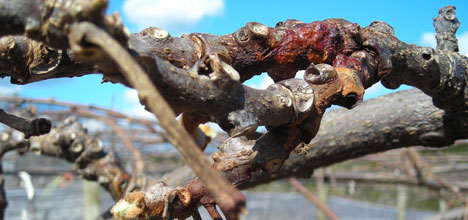Hundreds of jobs and millions of dollars will be lost in the next few years as the kiwifruit industry struggles to overcome the impacts of the vine killing disease Psa-V expected to cost the industry $885million.
A report by Lincoln University's Agribusiness and Economics Research Unit estimates 1410 jobs will be lost between now and 2015, and Psa will cost the industry between $310 million and $410 million in impacts of the disease and the cost of responding to it.
A further $740 million to $885 million in lost development will be felt.
Individual growers, who have cut out their diseased vines, are facing no income for at least two seasons and re-development costs of up to $60,000 a hectare.
The report was commissioned by Kiwifruit Vine Health and its financial recovery coordinator John Burke says it will be a crucial marker for the kiwifruit industry, and key stakeholders such as the Government, banks and community leaders, in understanding both the cost of Psa-V and how the industry can best recover from the disease.
Pseudomonas syringae pv actinidiae (Psa-V), was first discovered on a Te Puke kiwifruit orchard in November 2010 and despite an intensive and costly bio-security operation to contain it, the disease has spread to 1184 orchards, most of them in the Te Puke area.
While it was the highly lucrative gold Hort16A fruit which was initially hard hit, the disease has also been found in the green Hayward fruit, which so far appears to have more tolerance to it.
The industry is putting its hopes on a new gold fruit called G3, which has also shown an ability to withstand some of the impacts of the disease.
Research and development both in New Zealand and around the world is underway to find more tolerant varieties and orchard management systems and sprays to fight Psa-V.
However, the industry has accepted that the disease can't be cured nor eradicated and it must learn to live with it.
The Lincoln report considers two recovery strategies for the industry, one unassisted and the second assisted by industry stakeholders, to understand how those kiwifruit growers worst hit by the disease can be best supported to return the kiwifruit industry to its long-term growth path.
'It is clear from the report that the bright future the kiwifruit industry had prior to Psa-V being confirmed in New Zealand remains, once it recovers from Psa,” says John.
'To ensure this happens will require the tremendous level of cooperation, both from within the industry and between the industry and stakeholders, such as central and local government and banks, continues in the future.”
New Zealand Kiwifruit Growers Incorporated President Neil Trebilco welcomed the report and the fact the cost of Psa-V to the industry could, to some degree, be quantified.
'Having these baseline figures allows us to talk with the Government and banks with some certainty over what the industry needs in terms of support to get back to full speed again.”
An immediate concern identified in the report was for those growers who had cut out their vines due to Psa-V and will not harvest a 2012 crop.
A high proportion of these growers will face serious financial hurdles raising the approximately additional $60,000 per hectare (excluding debt servicing) required to re-establish their orchards with a new, more tolerant Psa-V variety.
'The exact cost of Psa will unfold over the next few years. While the immediate priority is helping those growers worst affected by Psa, the reality is there will need to be a long-term commitment to the industry to help it rebound from Psa's significant setback.
'To date, all groups we have worked with have understood the significance of the disease and were supportive of the industry as it first responded to the disease and now looks to recover from it.
'I'd like to thank all those stakeholders for their support and look forward to working with them in the future to return New Zealand's flagship horticultural industry to its long-term growth potential.”
A copy of the report is available on the KVH website at www.kvh.org.nz/financial_impact.



0 comments
Leave a Comment
You must be logged in to make a comment.